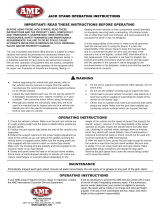Page is loading ...

OPERATING INSTRUCTIONS
Model 92200
OTR O-ring Installer Tool, up to 30" Rims
2347 Circuit Way, Brooksville, Florida, USA 34604
Phone: (+1) 352-799-1111 Toll Phone: (+1) 877-775-4AME (4263)
Fax: (+1) 352-799-1112 E-mail: sales@ameintl.net www.ameintl.net

To avoid serious personal in-
jury, always wear proper pro-
tective gear, such as hard
hats, safety glasses, gloves,
and steel toe shoes when us-
ing hydraulic equipment.
Failure to chock the wheels
and crib the vehicle can re-
sult in Serious injury or
death. Always deflate tires
before removing a wheel, a
rim, or part of a rim clamp or
nut. If you do not deflate the
tire, the tire could explode,
causing serious injury of
death. Always stand to one
side of the rim when using
the bead breaker. Standing to
one side of the bead breaker
allows you to maintain con-
trol of the bead breaker. If it
is not seated properly and
flies off the rim, the bead
breaker could cause serious
injury or death.
AME INTERNATIONAL
WWW.AMEINTL.NET
! WARNING !
- 2 -
Warning
This product as well as all tire tools should never be used by persons
unless they have been properly trained according to O.S.H.A. Regula-
tion #29CFR1910.177 entitled “Servicing Single-Piece and Multi-Piece
Rim Wheels.”
Caution
BEFORE USING THIS TOOL READ INSTRUCTIONS THOROUGHLY.
THE USE OF THIS TOOL IN ANY OTHER APPLICATION IS BOTH A
VOID OF WARRANTY AND CAN LEAD TO INJURY OR EVEN DEATH.
Operating Instructions
After placing a bead flange as far inside the bead of the tire as possible,
do as follows to accomplish full installation of the tire onto wheel assem-
bly.
1. Place bottom cross bar, the bar with the two
black ends as seen in Figure 1, inside of the
wheel at twelve and six o’clock position.
Make sure the gripping plates are tight
against the inner bevel of the wheel, adjust
by loosening set bolts and sliding out until
the tighten set bolts, adjust bottom gripping
plate and then top, making sure it is cen-
tered as possible.
2. Hang the “O” Ring on the top set bolt of the
bottom cross bar so as out of the way until
installation of “O” Ring (See Figure 2).
3. Slide top cross bar assembly over the
threaded center rod at the nine and three
o’clock positions, so that the push bar lines
up against the rim flange. Adjust for the tire
diameter of the wheel by loosening and tight-
ening set bolts as needed (See Figure 3).
OPERATING INSTRUCTIONS

AME INTERNATIONAL
WWW.AMEINTL.NET
- 3 -
4. Depending on amount of travel left on the threaded center rod choose a round spacer or spacers and
slide onto the threaded center rod as seen in Figure 4.
5. Turn the handle clockwise (See Figure 5a) onto the threaded enter rod, simply turn while standing to
one side until the push feet press against the rim flange, pushing the rim flange and bead of tire pass
the “O” Ring groove easy installation of the “O” Ring (See Figure 5b).
NOTE: If the hand crack becomes hard to turn this usually means that the bead flange is slightly
uneven with the wheel, simply tap the bead flange with a hammer and continue turning the hand
crack.
6. After you have installed the “O” Ring (Figure 6a) you can also install the locking-ring (Figure 6b).
OPERATING INSTRUCTIONS

7. After the locking– ring is locked into place turn the hand crack counter clockwise until off of the
threaded center rod (Figure 7).
NOTE: Hold pressure onto the top cross bar until with one hand at the beginning until you have
the hand crack threaded against spacer or spacers, and at the end while removing hand
crack from the threaded center rod. Simply remove device from wheel and inflate the tire.
OPERATING INSTRUCTIONS
AME INTERNATIONAL
WWW.AMEINTL.NET
- 4 -

OPERATING INSTRUCTIONS
1
8
11
2
9
3
10
Item # Product # Description No. Required
1 92200-001 Arms 2
2 92200-002 Feet 2
3 92200-003 5 9/16 Spacer 1
4 92200-004 3 1/8 Spacer 1
5 92200-005 1 9/16 Spacers 2
6 92200-006 Yellow Wing Nuts 2
7 92200-007 Black Wing Nuts 2
8 92200-008 Frame 1
9 92200-009 Crank 1
10 92200-010 Handle 1
11 92200-011 Treaded Rod 1
92200 OTR O-Ring Installer Tool,
Up to 30” Rims
6
7
5
1
2
4
REV. 1/13 AME INTERNATIONAL
2347 Circuit Way, Brooksville, Florida, USA 34604
Phone: (+1) 352-799-1111 Toll Phone: (+1) 877-775-4AME (4263)
Fax: (+1) 352-799-1112 E-mail: sales@ameintl.net www.ameintl.net
/
















